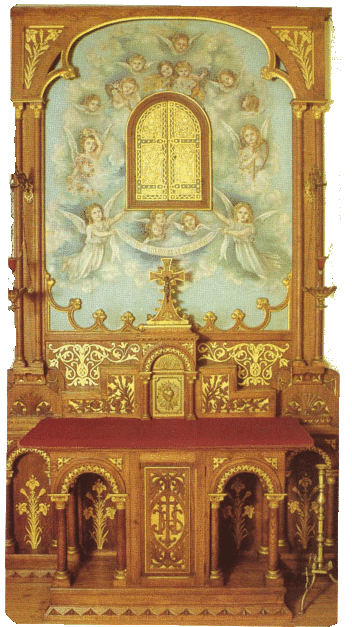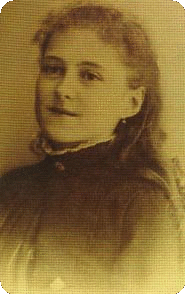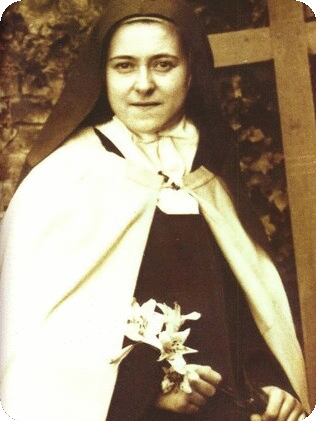Missionaries of the Blessed Sacrament
St. Therese of Lisieux

Fresco painted by St. Therese around the tabernacle of the Carmel in Lisieux
“To make God loved” “One Sunday in July 1887, Therese received a great Eucharistic grace at Saint-Pierre cathedral. At the end of the Mass, a picture of the Crucified Christ stuck out of her missal. She was struck by the idea that His Blood was falling to the ground without anyone thinking of collecting it. She decided to remain at the foot of the cross for the rest of her life to receive this precious Divine dew for the sake of sinners. In her heart sounded the cry of Jesus, I thirst. It was her thirst for love,” (Therese and Lisieux, Pierre Descouvemont and Helmuth Nils Loose.) Born in Alencon, France on January 2, 1873 Marie Francoise Therese Martin fell in love with Jesus at an early age. Under the loving example of her parents, Louis and Zelie, little Therese was brought - as Hannah's child Samuel - close to the altar and Heart of God in our midst. “The Martin spouses maintained a solid Eucharistic piety. Every morning, they rose at 5 o'clock to attend early Mass. As a member of the Blessed Sacrament Society, Monsieur Martin took part in monthly nocturnal adorations during the night of Thursday to the first Friday of the month,” (Descouvemont and Loose.) Although Zelie died when Therese was only four years old, the Little Saint was richly blessed by her mother's love for Jesus in the Most Holy Sacrament of the Altar. Even when the woman was too sick and weak to open the door of the Church, she would go to Mass, waiting outside of the doors to be close to Jesus come down from Heaven. The Little Flower also visited Jesus, and spent time before His Real Presence each day, throughout her life. Of her childhood Therese writes “Every afternoon I went for a little walk with papa. Together we would visit the Blessed Sacrament, each day visiting a new church,” (Descouvemont and Loose.) And while the other children spent their afternoons talking with their teachers, little Therese spent many hours conversing with the Eucharistic Heart of Jesus in the chapel. She knew that is was only His Living and True Heart that could fulfill her desires. In her own words, He was her “only Friend.”
Pouring her love out before His Real Presence in the Most Blessed Sacrament, her mission “to make God loved” began. Of her First Communion, in which Therese received Love Himself personally for the first time, she writes, “It was a kiss of love, I felt myself loved, and I replied, I love You and I give myself to You forever,” (Descouvemont and Loose.) In her little notebook Therese wrote down all the days on which she received Jesus in Holy Communion. Her second meeting with Jesus was equally as intimate. Of this wedding Therese recalled the words of St. Paul, “It is no longer I who live, but Christ who lives in me” (Gal. 2:20). The night which transformed St.Therese's life as a teenager was also resulting from this “fusion” of His Eucharistic Love with her love. At mid-night Mass on Christmas of 1886 “the strong and powerful God of the creche whom she had just received in communion clothed her with strength forever.” (Descouvemont and Loose.) Moreover it was a prayer card of Jesus, the Divine Prisoner in the tabernacle, that inspired Therese to be His Little flower of love. Painted on the card, which was given to Therese by her sister Pauline, was a little flower growing towards Jesus in the tabernacle. It was on its stem that Pauline wrote her name. Wishing to emulate this, St. Therese wrote, “The little flower of the Divine Prisoner told me so many things that I was immersed in them. Seeing Pauline's name written at the bottom of the little flower, I wished Therese's name could be there too and so I offered myself to Jesus to be His little flower.” As Descouvemont and Loose explain, “Jesus remains alone behind the door, like a prisoner in his cell: no one comes to visit him. The bars in the picture irresistibly brought to the minds of the child the grill of the Carmel behind which Pauline would make herself prisoner and hide herself definitively. On May 8th, in fact, in the chapter room of the monastery or rue de Livarot, Sister Agnes would make her religious profession. Therese hoped to join her there as soon as possible so that she too might offer the flower of her love to the Divine Prisoner of the Tabernacle. It was behind these walls that the Little Flower of God's Love grew and blossomed, spending herself that souls might come to His Sacred Heart in the Most Holy Eucharist. She writes, “God does not despise these hidden struggles with ourselves, so much richer in merit because they are unseen: The patient man is better than the valiant and he that ruleth his spirit than he that taketh cities. (Prov. xvi. 32). By our little acts of charity practiced in the shade we convert souls far away, we help missionaries, we win for them abundant alms, and by that means build actual dwellings both spiritual and material for our Eucharistic Lord.” St. Therese is the co-patroness of the Missions and of all of France - on equal footing with St. Joan of Arc - because of her tireless work and zeal for the salvation of souls, of whom she was their mother into eternal life, by God's grace and her own free-will response to His call to love. “The Divine Prisoner of the tabernacle awaits the visit and the gratitude of his creatures who abandon him! He knocks at the door of our heart to make of it a tabernacle where he can rest,” (Descouvemont and Loose.) In addition to her life itself, which is a masterpiece of Christ's Love, Therese has left being dozens of poems, songs and paintings revealing the Love of her Eucharistic Spouse. Among these are several tender images of the Christ Child, the Holy Face and Jesus in the Sacred Host. The pictures were painted not only on canvases, but also on the sacred chalices and vestments of priests. Therese even painted a fresco of angels surrounding the tabernacle of God in the nuns oratory where they had adoration of the Blessed Sacrament. Also remaining are many letters, which along with her autobiography Story of A Soul, provide spiritual food for countless souls to this day. The far reaching effects of this book were so powerful and so great that soldiers on the front lines during World War I were able to read of the Merciful Love of Jesus at work in her soul.
A story of St. Therese's great love for Jesus, her Bridegroom, in the Most Holy Eucharist sums up her life and eternal mission best. “On her return to Lisieux [from her visit with the Pope in Rome], she sent her gold bracelet to the chaplains of Montmartre so it could be melted into part of a great monstrance - a gesture that clearly expressed Therese's desire to keep watch day and night close to Jesus in the Eucharist,” (Descouvemont and Loose.) The monstrance was built and placed in Le Sacre Coeur in Paris where Jesus in the Most Blessed Sacrament is adored perpetually - day and night - to this day. St. Therese of Lisieux, Doctor of the Church, Patroness of the Missions and Lover of Jesus in the Holy Eucharist - pray for us! Copyright 1997, M.B.S. All rights reserved. Eucharistic Quotes "Do you realize that Jesus is there in the tabernacle expressly for you - for you alone? He burns with the desire to come into your heart...don't listen to the demon, laugh at him, and go without fear to receive the Jesus of peace and love... "Receive Communion often, very often...there you have the sole remedy, if you want to be cured. Jesus has not put this attraction in your heart for nothing..." "The guest of our soul knows our misery; He comes to find an empty tent within us - that is all He asks." - St. Therese of Lisieux: "By our little acts of charity practiced in the shade we convert souls far away, we help missionaries, we win for them abundant alms; and by that means build actual dwellings spiritual and material for our Eucharistic Lord." "It is not to remain in a golden ciborium that He comes down each day from Heaven, but to find another Heaven, the Heaven of our soul in which He takes delight." "You must open a little, or rather raise on high your corolla so that the Bread of Angels may come as divine dew to strengthen you, and to give you all that is wanting to you." - St. Therese of Lisieux, Doctor of the Church "How sweet it was, the first kiss of Jesus to my soul! Yes, it was a kiss of Love. I felt I was loved, and I too said: 'I love Thee, I give myself to Thee forever!' Jesus asked nothing of me, demanded no sacrifice. Already for a long time past, He and the little Therese had watched and understood one another... That day our meeting was no longer a simple look but a fusion. No longer were we two: Therese had disappeared as the drop of water which loses itself in the depths of the ocean, Jesus alone remained; the Master, the King! Had not Therese begged Him to take away from her, her liberty? That liberty made her afraid; so weak, so fragile did she feel herself that she longed to be united forever to Divine Strength." - From Story of A Soul, the Autobiography of St. Therese of Lisieux "How I loved the feasts!.... I especially loved the processions in honor of the Blessed Sacrament. What a joy it was for me to throw flowers beneath the feet of God!... I was never so happy as when I saw my roses touch the sacred Monstrance..." - from St. Therese's Autobiography Story of A Soul Our Lady: Whosoever shall die wearing my Scapular shall not suffer the flames of Hell. The Soul: My Dear Mother of Carmel, I thank thee for thy holy Scapular. Flower of Carmel, "At the time of Holy Communion I sometimes picture my soul under the figure of a little child of three or four years, who at play has got its hair tossed and its clothes soiled. These misfortunes have befallen me in battling with souls. But very soon the Blessed Virgin hastens to my aid: quickly, she takes off my dirty little pinafore, smoothes my hair and adorns it with a pretty ribbon or simply with a little flower... and this suffices to render me pleasing and enables me to sit at the Banquet of Angels without blushing." - St. Therese of Lisieux, Counsels and Reminiscences "At last there dawned the most beautiful day of all the days of my life. How perfectly I remember even the smallest details of those sacred hours! The joyful awakening, the reverent and tender embraces of my mistresses and older companions, the room filled with white frocks, like so many snowflakes, where each child was dressed in turn." - St. Therese "I want to shine like a little candle before His altar." - St. Therese of Lisieux Following is an excerpt from Therese and Lisieux by Pierre Descouvemont and Helmuth Nils Loose: "On her return to Lisieux [from her pilgrimage to Rome to see the Pope regarding her entrance to the Carmel], she sent her gold bracelet to the chaplains of Montmarte so it could be melted into part of a great monstrance - a gesture that clearly expressed Therese's desire to keep watch day and night close to Jesus in the Eucharist." Note: The monstrance containing the gold of Therese's bracelet is at Le Sacre Coeur in Paris, France where Jesus in the Most Blessed Sacrament is perpetually adored to this day. "My mission (is) to make God loved...," - St. Therese of Lisieux. "God does not despise these hidden struggles with ourselves, so much richer in merit because they are unseen: The patient man is better than the valiant and he that ruleth his spirit than he that taketh cities. (Prov. xvi. 32). By our little acts of charity practiced in the shade we convert souls far away, we help missionaries, we win for them abundant alms, and by that means build actual dwellings both spiritual and materials for our Eucharistic Lord." - St. Therese Of her First Communion, in which Therese received Love Himself personally for the first time, she writes, "It was a kiss of love, I felt myself loved, and I replied, I love You and I give myself to You forever." In her little notebook Therese wrote down all the days on which she received Jesus in Holy Communion. Her second meeting with Jesus was equally as intimate. Of this wedding Therese recalled the words of St. Paul, "It is no longer I who life, but Christ who lives in me" (Gal. 2:20). Quotes of St. Therese of Lisieux, The Little Flower: "By our little acts of charity practiced in the shade we convert souls far away, we help missionaries, we win for them abundant alms; and by that means build actual dwellings spiritual and material for our Eucharistic Lord." "My patrons in Heaven and my chosen favorites are those who have stolen it - like the Holy Innocents and the Good Thief. The great Saints have earned it by their works; as for me, I will imitate the thieves, I will have it by ruse, a ruse of Love which will open its gates to me and to poor sinners. The Holy Ghost encourages me, saying in the Book of Proverbs: "O little one, come, learn subtilty of Me." (Prov. 1:4)" - From Counsels and Reminiscences Quotes of St Therese of Lisieux: "By our little acts of charity practiced in the shade we convert souls far away, we help missionaries, we win for them abundant alms; and by that means build actual dwellings spiritual and material for our Eucharistic Lord." "It is not to remain in a golden ciborium that He comes down each day from Heaven, but to find another Heaven, the Heaven of our soul in which He takes delight." "You must open a little, or rather raise on high your corolla so that the Bread of Angels may come as divine dew to strengthen you, and to give you all that is wanting to you." "Living Bread, Heavenly Bread, Eucharist Divine Glorious Guardian of my soul, - Excerpts from the poem "I am just a speck of dust, "Remember that in ascending to the Father Jesus, it is you who, despite the blasphemies - from the poem Jesus, My Beloved, Remember!, St. Therese of Lisieux O Jesus! on this day, you have fulfilled all my desires.
The Sacristans of Carmel Here below our sweet office O supreme mystery, Heaven There are no queens on earth This world's greatest honours We bring a holy envy But His love has chosen us. Sublime mission of the Priest, We must help the apostles The hidden God of the tabernacle Our happiness and our glory I find the fruit of love." (St. Therese) "La saintet c'est une disposition du coeur qui nous rend humbles et petits entre les bras de Dieu, conscients de notre faiblesse, et confiants jusqu'a l'audace en sa bont de Pere." - Ste. Therese de l'Enfant-Jesus "Holiness is a disposition of the heart that makes us humble and little in the arms of God, aware of our weakness, and confident -- in the most audacious way -- in His Fatherly goodness." - St. Therese of the Infant Jesus Prayer for Priests by St. Therese of Lisieux O Jesus, eternal Priest, keep your priests within the shelter of Your Sacred Heart, where none may touch them. Keep unstained their anointed hands, which daily touch Your Sacred Body. Keep unsullied their lips, daily purpled with your Precious Blood. Keep pure and unearthly their hearts, sealed with the sublime mark of the priesthood. Let Your holy love surround them and shield them from the worlds contagion. Bless their labors with abundant fruit, and may the souls to whom they minister be their joy and consolation here and in heaven their beautiful and everlasting crown. Amen. St. Therese, Patroness of Missions & Church Doctor (1873-1897), France--Oct. 1 "Beloved, let us love one another, for love is of God" (1 Jn 4:7). "Do you realize that Jesus is there in the tabernacles expressly for you, for you alone? He burns with desire to come into your heart" (St.Therese of Lisieux). St. Therese of the Child Jesus, Carmelite, Church Doctor (1873-1897), France—Oct. 1 “Imitate the Eucharist and you will become a saint”(St. Therese of Lisieux, Religious, Patroness of Missions). St. Therese of the Child Jesus, Carmelite, Doctor (1873-1897), France—Oct. 1 |
ADDRESS
Missionaries of the Blessed SacramentP.O. Box 1701
Plattsburgh, NY 12901, USA
CONTACT
Phone: (518) 561-8193
E-mail: ACFP2000@aol.com
Copyright 2000-2026 Missionaries of the Blessed Sacrament. All rights reserved.

